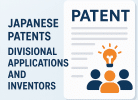The Ministry of Economy, Trade and Industry (METI) and the Japan Patent Office (JPO) announced their plans for reforming Intellectual Property related laws of Patent, Trademark, Industrial Design, as part of Japan’s revitalization Strategy put forth by the Abe administration. The two Government Agencies are jointly working towards introducing the various reform proposals in the Diet by early March.
The amendment in the Japanese Patent Law will re-introduce a post grant opposition which was abolished once back in 2003. The new post-grant opposition period will be 6 months after the granting of the patent. Currently, the only possibility for third parties to challenge a granted patent under the Japanese patent system is through invalidation. The old law will be re-introduced in order to counter the high costs and long duration of the invalidation suits.
The Trademark Act reform will widen the scope of protection by adding five new types of trademarks from (1) Motion marks, (2) Hologram marks, (3) Color marks, to (4) Position marks and (5) Sound marks.
In the Design Act reform, the Diet will most likely pass a bill approving JPO’s accession to the Geneva Act of the Hague Agreement. Under the Agreement, it is possible to obtain multiple filings of applications with all of the contracting parties by submitting a single application form to the International Bureau. Japan’s accession to the Geneva Act of the Hague Agreement will simplify the procedures and reduce design prosecution costs when protection is sought in multiple contracting parties. The official fee for the Hague application is approximately $440 for the first design and $20 for each additional design. The number of contracting parties has been increasing by three to five countries annually, and currently stands at 61 countries/regions (as of January 2014).






